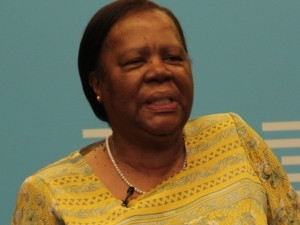
South Africa's youth could be the answer to a range of challenges facing Africa and there is huge opportunity for them to use innovation and technology as the tool to do this.
This is according to science and technology minister Naledi Pandor, speaking at the Southern Africa Telecommunication Networks and Applications Conference (SATNAC) in Hermanus, Western Cape.
Pandor said as Africans, we must position ourselves to compete globally and foster a culture of innovation and entrepreneurship, particularly among our youth.
"Who better than the youth to take advantage of the unprecedented growth in many technology sectors - in particular in mobile and information and communication technology?" asked Pandor.
Africa is the second-fastest growing region in the world, with seven of the 10 fastest-growing global economies. Pandor believes this growth can only be sustained through innovation and ensuring this innovation addresses the global challenges Africa faces.
"The future for our country and the African continent depends on our development of talented scientists and entrepreneurs working in scarce-skills fields who can take up the opportunity to develop new technologies and innovative solutions for our pressing problems," said the minister.
"We are investing in the capacity to create and diffuse new knowledge. Following global trends, we are investing in the modernisation of research and development infrastructure, and in particular, new instruments and facilities (like the Centre for High Performance Computing, and SKA) as key components in the drive to ensure we have the capacity to generate new knowledge."
ICT roadmap
The minister said the Department of Science and Technology (DST) has an ICT research and development and innovation strategy, and a roadmap that is being implemented by the Council for Scientific and Industrial Research's Meraka Institute.
"Its aim is to catalyse the development of an innovative, sustainable and indigenous IT industry that addresses a significant portion of South Africa's IT needs, as well as attracting investments from global IT corporations in R&D and manufacturing facilities in South Africa."
According to Pandor, it is key to stimulate public-private partnerships in IT research and development and innovation.
"With the increased investment in R&D by both private and public sectors, opportunities exist for bold interventions that will enable South Africa to secure a greater share of global markets in both R&D and manufacturing.
"Over the last three years, the DST has invested R62 million in ICT through our Industry Innovation Partnership fund, although the fund has largely been used in co-funding with ICT multinationals."
However, she noted the DST is now targeting South African-owned companies, and in future Telkom's 16 university centres of excellence could be the partners.
Access issues
Pandor said the DST is trying to position South Africa and the African continent as leaders in IT but Internet access remains a challenge in SA.
"High broadband costs, limited research and development capacity, and a lack of innovative economic models for providing connectivity to rural communities [are challenges]."
She said the department is working on a number of projects to help bring technological solutions to problems in rural communities. One of these is the Digital Doorway project that provides terminals in rural locations that are loaded with content and applications, which include science software, HIV/AIDS information and learning material, games, mathematics tutorials, open source software and music programs.
"Currently, more than 200 units have been deployed across the country, mainly in rural areas where access to computers is still a big challenge."
Pandor noted the DST's aim is to catalyse the development of an innovative, sustainable and indigenous IT industry that addresses a significant portion of South Africa's IT needs, as well as attracting investments from global IT corporations in R&D and manufacturing facilities in South Africa.
Share